
(This is the first of a series of game improvement articles focused specifically on improving the scores of recreational women golfers. In my series I will first cover how to increase distance off the tee, then move to your putting and finally address the short game — three areas where you can most quickly shave strokes off your score. Your course may closed right now since it’s winter. What we’ll cover in the next 60-90 days will be things you can work on at home.)
Study after study reveals that the farther a player hits the ball off the tee, the lower her scoring average.
This is the first of two posts about increasing your driving distance. It is based on the recognition that the average woman drives the ball 125 yards and has a handicap index of 28.9, according to the USGA. Most of us are unaware that the average female golfer shoots 108, and that 35% of recreational women players shoot just over 120 on a regular basis. If your drives sometimes go short and/or way out to the right, or go high but not far, this article is definitely for you.
It involves an aspect of my game I am constantly working on with my coach— getting longer off the tee by eliminating obvious mechanical flaws.
My coach is Mario Bevilacqua, recently ranked by Golf Digest as a Best Young Teacher in America. For Nevada, Mario is ranked among all instructors by the magazine as one of the Best in State. At TPC Summerlin, Mario teaches some of the world’s best women professionals, men on tour plus top female amateurs and collegiate players. He also works almost daily with many players just like you and me. He knows the swing moves recreational women players make that rob them of driving distance, that cause those drives that are short and often go out softly and way to the right, or which go short and straight up in the air (that dreaded “Sky Ball!”).
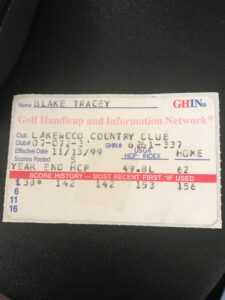
My first GHIN card!
Since I started working with Mario on my distance in 2019, I have gained 30 yards off the tee and shot my all-time low round, a 75. What a magical day that was. When I first started playing golf in 1999, I constantly fought the habit of doing what is shown in this article. Back then I drove the ball about 100-120 yards. My initial handicap index was 49.8, as my first handicap card pictured here shows. I shot more than 150 more than once (yikes!). My index today hovers around 10 and has been as low as 7.
In this post, and in the pictures you see, Mario and I demonstrate what he feels is the most common distance-robbing move he sees in the swings of recreational women players. How much difference could the change shown in these pictures mean to you? Women whose handicaps are half that of the national average drive the ball about 30 yards longer off the tee than the average woman player, according to the USGA’s driving distance studies. So that means this change, if you successfully adopt it, could mean going from having the index of an average player, that’s 28.9, to half that number, a 14.4. If you are 30 yards longer off the tee you’d be hitting at least three clubs less into every par four. At least three clubs less on every par three. It means when you used to need to hit a hybrid you’d be hitting a 7-iron or less. Keep in mind, if you do what is shown here you not only will hit your driver farther but you are going to hit all of your clubs farther. Next time you play, when you get to your average drive in the fairway look forward 30 yards and think of the advantage of being that much closer to the hole.

Picture A
Picture A shows me making the distance-robbing mistake. My right arm has collapsed down and almost onto my right hip and my left arm is bent noticeably around my neck. My hips have hardly turned at all.
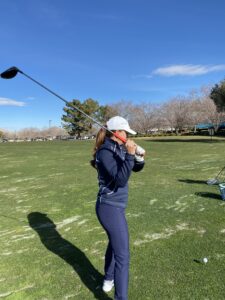
Picture B
Picture B shows the same “arms only” swing from behind. You can also see in B that I have made little hip turn, that my clubface is open about 60 degrees and that my shoulders, while they have turned, remain almost parallel to the ground. “For all players, but even more so for women than men, hips are the source of both power and clubhead speed in the golf swing,” Mario said as we took these photos.
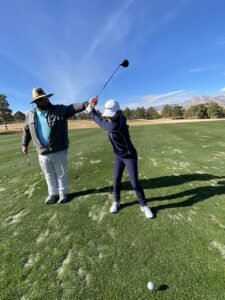
Picture C
Picture C shows Mario guiding me to the top of my backswing correctly. My left arm is what he said is its “natural anatomical position”, meaning my arm is in the same position as when it just hangs down while I am standing or when I address the ball. My arm is NOT straight at the top of my backswing.
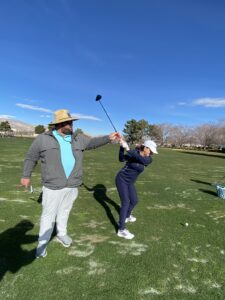
Picture D
In Picture D, you can see what your swing should look like from behind the ball. My left shoulder is under my chin, my right arm has not dropped so deeply down and toward my right hip as in B, and my clubface is no longer wide open (compare where it is facing in D to where it facing in A.)
Stopping yourself from folding your arms as shown in A and B is not easy. I regress and start folding my arms every few months. At first, while trying to make this change your swing will feel astonishingly short and choppy. At the top of your backswing you will feel as if you have only taken the club back waist high. Look at me in Picture D. My swing IS much shorter than in Picture A, but in D the resulting shot will send the ball, literally, 100 yards farther. It’s clear I am in a much more powerful hitting position in D than in A.
An obvious question is what about your downswing. If you get in the correct position at the top of your backswing, you are highly likely to naturally bring the club back to where it started at address, Mario said. “Just don’t stop. Finish your swing without hesitation.”
Trust me on this. Turn your hips and shoulders together for the first two feet as the club moves away from the ball and refrain from letting your left arm bend and right elbow collapse. “Get your left shoulder under the level of your chin,” Mario says. Your swing won’t be short. At first, you will miss shots, maybe dozens of them. However, once you have hit 50 or so you will hit some of them well, and much farther. Have a friend shoot some video on your phone and look at what you are doing compared to these photos.
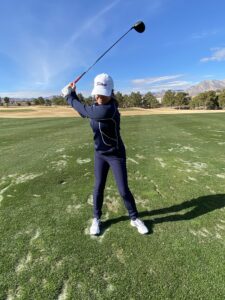
Picture E
If you have an arm-collapsing swing like described here, Mario says begin to try fixing the problem with a 9-iron. Once you start getting some results with a 9-iron move on to your longer clubs. Eventually you’ll have your driver in hand and look as I do in Picture E.
If you live where courses are still closed due to winter, you can practice this change indoors using this training device. Weighted, making it good exercise, it also sets your hands into a proper grip and will make you complete your swing. You can get it online at Amazon or any golf store.
Stick with it. It takes hundreds of swings and a few months of effort to make a dramatic change like this. Remember, it’s worth it because if you are an average player, this change alone has the potential to cut your handicap in half.
If you find yourself digging my blog, please feel free to forward it to a friend who might also enjoy it.
As always, I would love to hear from you — feel free to shoot me an email to blake@thewomangolfer.com with any questions, comments or suggestions for future posts.



